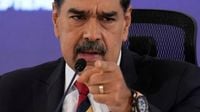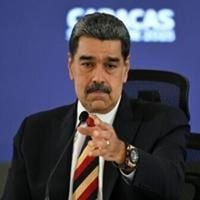Venezuelan President Nicolas Maduro has issued a stark warning to both domestic and international audiences, declaring that his country stands ready to defend itself against what he describes as an unprecedented threat from the United States. Speaking at a press conference in Caracas on September 1, 2025, Maduro announced that Venezuela is in a state of “maximum readiness to defend” itself, following what he claims is a significant military build-up by the U.S. Navy in the Caribbean.
According to multiple reports including those from AFP, The Associated Press, and Reuters, Maduro asserted that eight U.S. military vessels—equipped with a combined total of 1,200 missiles—are currently targeting Venezuelan territory. He described this as “the biggest threat that has been seen on our continent in the last 100 years.” In his words, “They are seeking a regime change through military threat. If Venezuela were attacked, we would immediately move to armed struggle in defence of our territory.”
Maduro’s alarm comes amid a U.S. naval deployment to the southern Caribbean, which Washington insists is part of an anti-drug trafficking operation. The U.S. Navy’s current presence in the region includes two Aegis guided-missile destroyers—the USS Gravely and USS Jason Dunham—along with the destroyer USS Sampson and the cruiser USS Lake Erie. A U.S. official confirmed to Reuters that a nuclear-powered fast-attack submarine is also part of the force. The Associated Press noted that this presence could soon expand further, with the potential arrival of three amphibious assault ships carrying more than 4,000 sailors and Marines.
Despite these deployments, the U.S. has made no public indication of plans to put American boots on Venezuelan soil. U.S. officials have stated that the operation is aimed squarely at combating Latin American drug cartels, not at invading Venezuela. Nevertheless, the scale and proximity of the military buildup have fueled speculation and anxiety in Caracas, with Maduro and his government treating the move as a direct existential threat.
Maduro’s response has been multifaceted and robust. He has deployed Venezuelan troops along the country’s coastline and its border with Colombia, and he has called on thousands of citizens to join armed militias. At the press conference, he declared, “In the face of this maximum military pressure, we have declared maximum preparedness for the defence of Venezuela.” He further claimed that more than eight million Venezuelans have enlisted as reservists, a figure that underscores his efforts to rally the population against what he frames as foreign aggression.
Adding to the sense of crisis, Maduro said, “If Venezuela were attacked, we would immediately move to armed struggle in defence of our territory,” pledging to declare “a republic in arms.” He characterized the U.S. deployment as “an extravagant, unjustifiable, immoral and absolutely criminal and bloody threat.”
The rhetoric has not been limited to the Venezuelan government. Opposition leader María Corina Machado has come out in support of the U.S. naval deployment, calling it “the right approach” toward Venezuela’s government, which she described as a “criminal enterprise.” Meanwhile, Guyana’s President Irfaan Ali welcomed the U.S. military presence, stating it would help eliminate threats to his country’s security. This is particularly relevant given the ongoing border dispute between Guyana and Venezuela over the oil-rich Essequibo region.
On the diplomatic front, Venezuelan Foreign Minister Yván Gil argued that the U.S. deployment is based on a “false narrative.” Citing a United Nations report, he noted that 87% of cocaine produced in Colombia departs via the Pacific, with only about 5% passing through Venezuela. Gil warned that the U.S. narrative “threatens the entire region,” and an attack on Venezuela “would really mean a complete destabilization of the region.” He added, “Let us immediately demand an end to this deployment, which has no other reason than to threaten a sovereign people.”
Despite the heated rhetoric, analysts interviewed by AFP and other outlets suggest that the U.S. military build-up is unlikely to result in an actual invasion or direct attack. Instead, it appears to be intended as a show of force and a means to increase pressure on Maduro’s government, which has been the target of U.S. policy since Donald Trump’s first presidential term. Trump’s administration has imposed an oil embargo and other sanctions, but these measures have so far failed to dislodge Maduro from power.
Relations between Caracas and Washington remain fraught. Maduro claims to maintain two lines of communication with the Trump administration—one with the State Department and another with special envoy Richard Grenell. However, he lamented that lines of communication have largely broken down, stating, “Our country will never give in to blackmail or threats of any kind.” He also accused U.S. Secretary of State Marco Rubio of pushing President Trump “into a bloodbath... with a massacre against the people of Venezuela.”
The U.S., for its part, has doubled its reward to $50 million for information leading to Maduro’s arrest, citing allegations that he leads a drug cartel. However, internal intelligence memos reported by U.S. media have cast doubt on the veracity of claims linking Maduro to Venezuelan criminal organizations, complicating the narrative pushed by the Trump administration.
Maduro’s political legitimacy remains hotly contested. He insists he is the rightful ruler of Venezuela after winning a third term in the disputed 2024 presidential election. The opposition, led by Machado, claims victory in that vote, and neither the U.S. nor most regional governments have recognized Maduro’s win. Allegations of fraud and voter oppression have dogged both the 2024 and 2018 elections, fueling international skepticism.
In the wider region, the U.S. deployment has had mixed reception. While Guyana’s government sees it as a security boon amid its border dispute with Venezuela, other Latin American leaders and organizations have expressed concern that the military buildup could destabilize the entire continent. Caracas has petitioned the United Nations to demand an “immediate cessation” of the U.S. military presence in the Caribbean.
As tensions simmer, the situation remains volatile, with both sides showing little sign of backing down. For now, the world watches as Venezuela braces itself for what Maduro calls “a period of armed struggle in defense of the national territory,” while the U.S. continues to insist its presence is aimed at curbing drug trafficking. The stakes are high, and the outcome uncertain, as the Caribbean becomes the stage for a new chapter in a long-running geopolitical drama.


